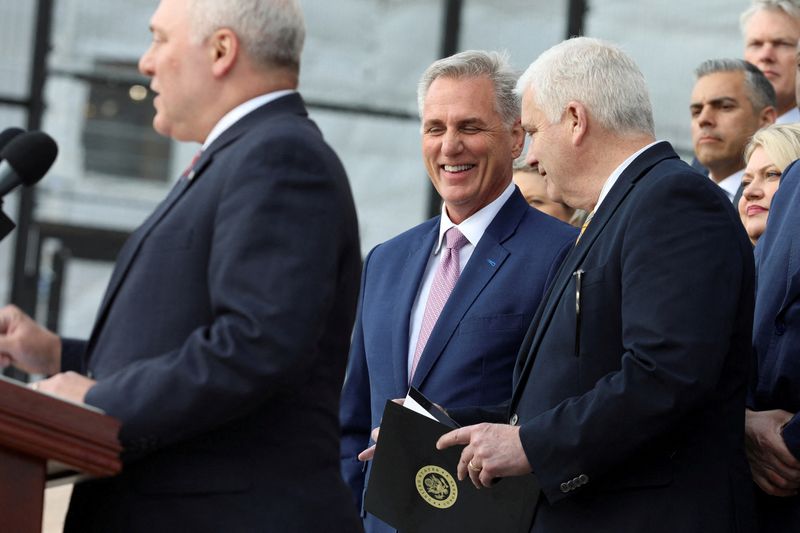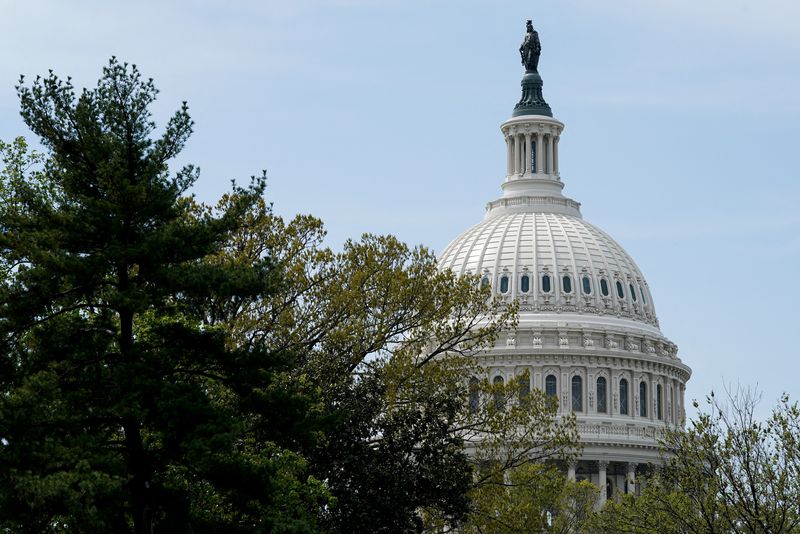By Richard Cowan
WASHINGTON (Reuters) - Republicans in the U.S. House of Representatives on Tuesday held a "robust" discussion over Speaker Kevin McCarthy's plans for raising the federal debt limit and cutting future government spending, amid signs of discontent ranging from far-right to more moderate wings of the party.
On Monday, McCarthy outlined a plan for extending the government's borrowing authority through sometime next year. He said it would have to be coupled with rolling back next year's spending to 2022 levels, followed by a decade of only 1% annual increases.
"Congressional Republicans are ready to act," McCarthy declared in a speech to the New York Stock Exchange.
But Republicans who attended a closed-door meeting conducted by McCarthy on Tuesday emerged saying such legislation was not yet ripe for action.
"It's just conceptual," said Representative Doug LaMalfa, adding, "There's work in finalizing the package."
Representative Nancy Mace told reporters she was uncertain whether leaders' hopes of passing a bill by the end of this month to avert an historic default on debt payments were feasible.
Sometime this summer, the Treasury Department will be unable to manage its debt under the current $31.4 trillion limit on borrowing, according to the Biden administration and the non-partisan Congressional Budget Office.
Anything that passes the conservative-led House is expected to be rejected by the Democrat-led Senate, requiring high-level negotiations between McCarthy and President Joe Biden.
"Don't bother with partisan wish lists and unrealistic proposals that will never solve this debt default crisis," Senate Majority Leader Chuck Schumer, a Democrat, warned House Republicans in a speech to the Senate.
Representative Kevin Hern, who heads a large group of House conservatives, told reporters McCarthy's plan would increase Treasury borrowing authority by $2 trillion.
But Mace said McCarthy showed rank-and-file Republicans a series of options, projected onto a screen, that included the possibilities of a $1 trillion or $2 trillion debt limit increase with various time frames attached.
Some Republicans, Mace said, argued for "a stronger package" to present to the Senate since it will be altered in that chamber and "we want as much leverage as possible" now.
Representative Scott Perry, who heads the far-right House Freedom Caucus that McCarthy has been laboring to please since his chaotic election to be speaker in early January, voiced anger over the process.
"I don't know why we would offer anything that we don't want to have offered. Why are we saying $2 trillion, $1 trillion or anything?" Perry said referring to a debt limit hike.
Amid the infighting, there were plenty of areas of agreement - even delight - among Republicans after hearing McCarthy's summary of goals.
Those include repealing Democrats' recently enacted tax credits to spur sales of electric vehicles to lower U.S. carbon emissions and imposing tougher requirements on qualifying for the federal Medicaid healthcare and SNAP food stamp programs for the poor.

Hern said that all "discretionary" programs, other than the Defense Department's, would be included in the tough spending limits. He added, however, that spending for veterans' programs would be "taken care of" in the appropriations process later this year. That apparently was a reference to cutting some programs more deeply in order to compensate for maintaining growth in veterans' spending.
Hern did not respond directly when asked whether House Republicans would pare back funding for some federal law enforcement, such as the FBI, as former President Donald Trump has urged.
